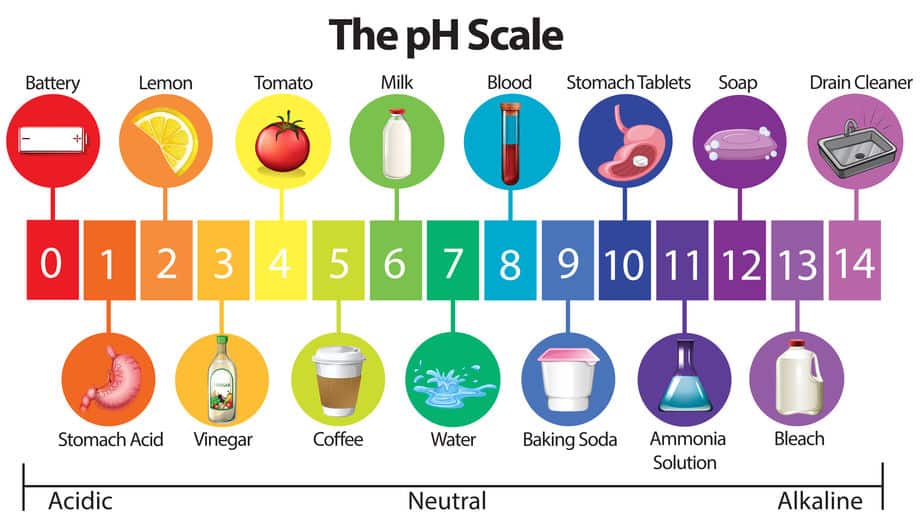pH is a crucial aspect of saltwater pool chemistry because it affects the water’s overall balance and the effectiveness of other pool chemicals. The pH level of pool water should be between 7.2 and 7.8 to maintain a healthy swimming environment.
As the graphic above shows, regular water normally has a pH of 7. Baking soda can be used in a pool to raise the pH and chlorine will help to raise pH as well. An acid like muriatic acid or sodium bisulfate can be used to lower pH when needed.
A pH level outside of this range can cause discomfort to swimmers, reduce the effectiveness of sanitizers and other pool chemicals, and can damage pool equipment.
Testing pH In A Saltwater Pool
The easiest way to test for pH in a saltwater pool is with test strips or with a digital water tester. While you can test water samples on your own by using the kits that regular pool owners use, I don’t even own one and stick with the test strips.
The three options can be summarized as follows:
- Test strips: These are simple, inexpensive, and easy to use. Dip a strip into the water, and it will change color, indicating the pH level. However, test strips can be less accurate than other methods, and they can also be affected by water temperature, sunlight, and other factors. You can find strips that test for multiple things including salt, chlorine, pH, water hardness, metals and more, all in one strip.
- Water test kit: These typically include multiple chemicals that need to be added to a sample of pool water. The water will change color, indicating the pH level. Water test kits can be more accurate than test strips and can test for other parameters, such as chlorine levels. However, they can be more time-consuming and require more careful handling of the chemicals.
- Digital water tester: These are the most advanced and accurate option. Digital testers measure the pH level using a probe that is inserted into the water. They can also provide results for other parameters, such as chlorine levels. However, digital testers can be more expensive than the other methods.
Overall, each method has its pros and cons, and the choice of which to use depends on the individual’s needs and preferences. Test strips may be suitable for quick and occasional testing, while water test kits or digital testers may be preferred for more frequent and accurate testing.
You can also take a water sample to your pool company if they’re willing to test for free.
pH Fluctuates For Several Reasons
Saltwater pools tend to have a pH level that will drift higher over time not only because chlorine raises it but because of the chlorinator that produces the chlorine. The chlorination process is called electrolysis and will tend to produce by products that raise a pH over time.
The pH (potential hydrogen) level of pool water can fluctuate due to a variety of other factors, including:
- Carbon dioxide: When carbon dioxide dissolves in pool water, it can create carbonic acid, which can lower the pH level. One way to keep CO2 in check is to run the pump because the return jets create water bubbles which increases off gassing to remove excess gas. In that regard, high carbon dioxide is generally not a problem you’ll face but running your pump as a matter of course can help to alleviate this concern.
- Chlorine: Chlorine is a strong oxidizer and can raise the pH level when it is added to the pool water. Your chlorinator produces chlorine but there may be times where you need to manually add chlorine for a specific reason.
- Bather waste: The oils, sweat, and other contaminants introduced into the water by swimmers can cause the pH level to rise. You can help your cause by showering before entering the pool to remove contaminants like bodily fluids (sweat, oils) and hygiene products (deodorants, lotions) that you track into the water.
- Rainwater: Rainwater can be slightly acidic, and when it enters the pool, it can lower the pH level. Not much you can do about rain except that too much of it might mean draining some water to lower the water level.
To maintain the pH level within the desired range, pool owners may need to add pH adjusters such as sodium carbonate (soda ash) or sodium bisulfate (dry acid) to increase or decrease the pH level, respectively. It’s essential to regularly test the pH level of the pool water and adjust it as necessary to maintain a healthy and comfortable swimming environment.

